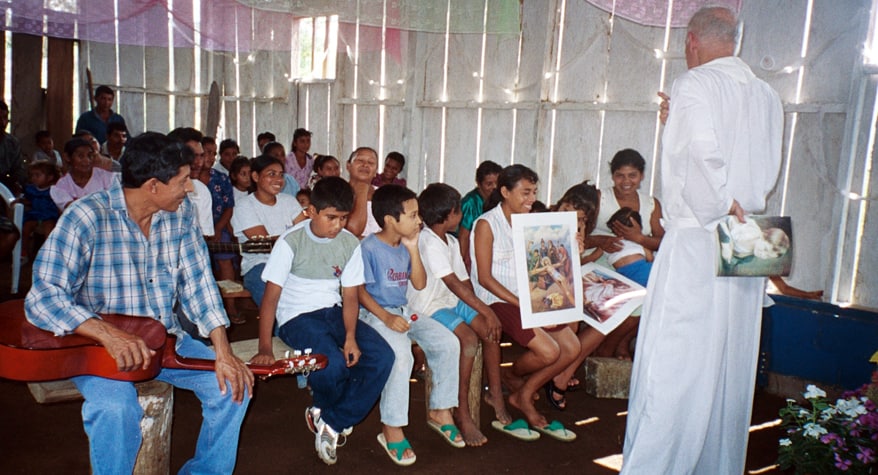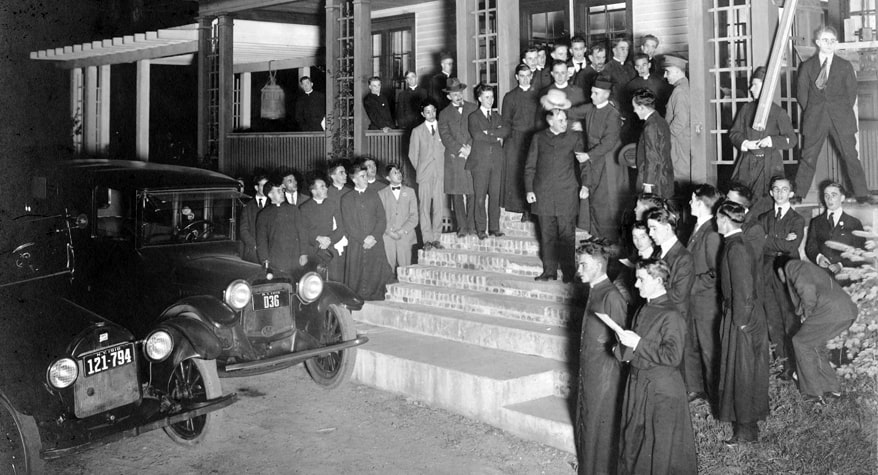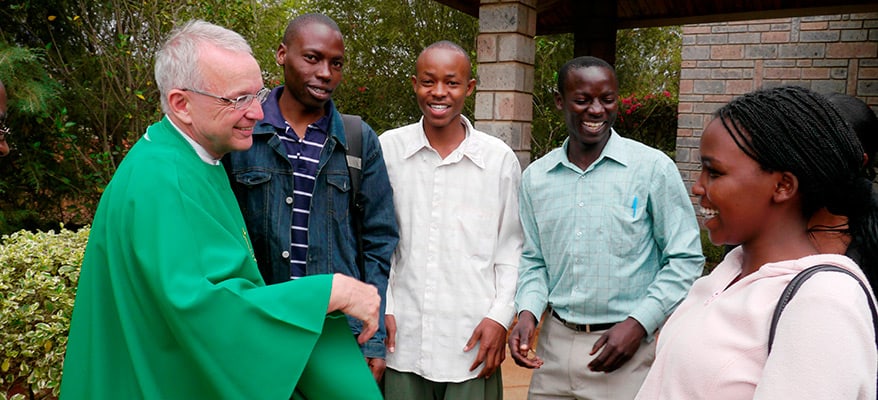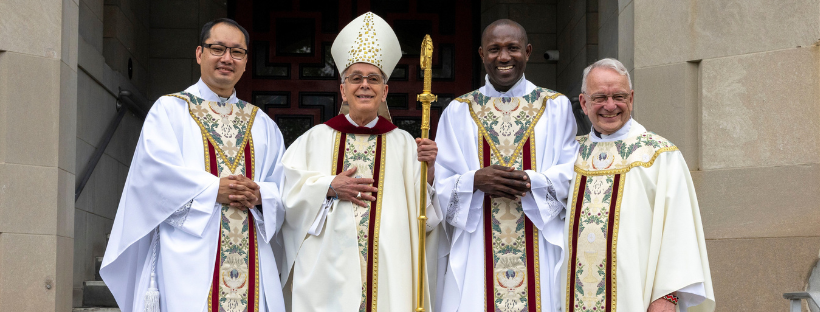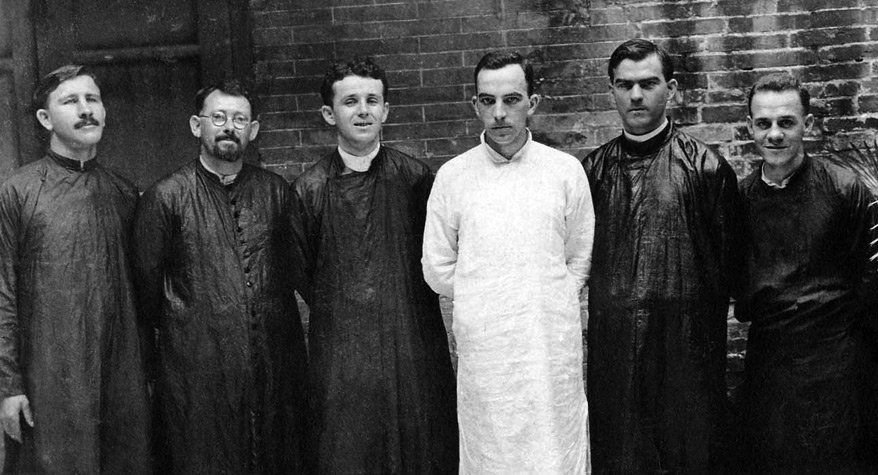
by Maryknoll Society | Sep 11, 2012 | Adventures in Mission, Call to Mission, Notable Maryknollers
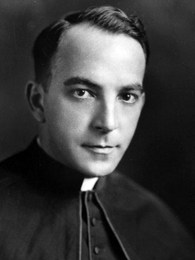 “We must love before we can truly value an alien culture,” Bishop Francis Xavier Ford, M.M.
“We must love before we can truly value an alien culture,” Bishop Francis Xavier Ford, M.M.
On September 14, 1912 Francis Xavier Ford started his pastoral life with Maryknoll.
Ford was the first Maryknoll seminarian. He was one of three Maryknoll priests, along with co-founder Father Thomas F. Price, who were sent on the first overseas mission for the U.S. church. They departed for China on September 8, 1918.
Ford was born on January 11, 1892 in Brooklyn, New York, to Austin and Elizabeth Ford. He was baptized with the name Francis Xavier after the great Jesuit missioner who brought Catholicism to Japan during 1594. He seemed destined for a life in mission.
Francis Xavier Ford was 20 when he learned that two U.S. priests, Father James Anthony Walsh and Father Price, were seeking students for the new foreign mission society they had formed during 1911. He applied and became the first priesthood candidate of the Catholic Foreign Mission Society of America that now is known as the Maryknoll Fathers and Brothers.
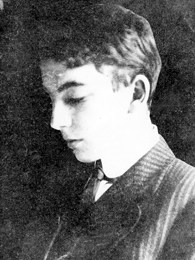 A Life Of Mission In China
A Life Of Mission In China
Ordained only a year before his arrival in China, Father Ford and his companions quickly discovered that mission work would require all of their spiritual strengths and abilities to cultivate human relationships across cultural differences.
Ford spent his first seven years in Yeungkong. During 1925, he went to serve in mission in Kaying, and for the next 27 years his leadership was crucial to the development of Christian communities in that part of China. Pope Pius XI, during 1935, named him the first bishop of Kaying.
Bishop Ford experienced mission as more than just building structures. He understood the essence of mission as building person-to-person relationships. The one structure he did create was a seminary for the education and training of young Chinese priests.
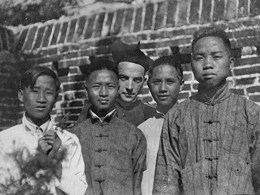 During his work in China, Bishop Ford developed a fondness for the people and he adopted their culture. Through his homilies and mediations, Bishop Ford drew on inspirations from the liturgical year and the rhythms, or seasons, of life in China. By April 1951, the Kaying Diocese had 19 Chinese priests and 26 Chinese Sisters to serve 23,000 Catholics.
During his work in China, Bishop Ford developed a fondness for the people and he adopted their culture. Through his homilies and mediations, Bishop Ford drew on inspirations from the liturgical year and the rhythms, or seasons, of life in China. By April 1951, the Kaying Diocese had 19 Chinese priests and 26 Chinese Sisters to serve 23,000 Catholics.
Political Pressure Mounts
The establishment of political factions and the presence of violence in China created an uneasy way of life for Maryknoll missioners. When Japan began its attacks on China, Bishop Ford’s Kaying area was bombed. The situation became more dangerous for U.S. missioners after the December 1941 attack on Pearl Harbor.
During the war and subsequent civil unrest, Bishop Ford shared a hope for a unified China. He urged Maryknoll and other missioners to assume civil responsibilities and to exercise their faith by standing by their Chinese brothers and sisters. The internal conflict between the Communist and Nationalist forces in China eventually exploded with the Communist party seizing power during May 1949. At the time, it was clear that Bishop Ford and other Maryknollers were viewed as agents of American imperialism.
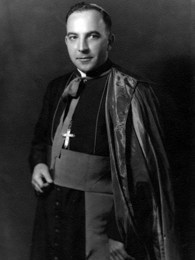 Chinese officials soon began closing churches and parish houses. When the Unites States entered into war with North Korea, tensions grew and Bishop Ford was prohibited from participating in activities outside of Kaying. The first Maryknoll priests and Sisters were arrested and deported during December 1950.
Chinese officials soon began closing churches and parish houses. When the Unites States entered into war with North Korea, tensions grew and Bishop Ford was prohibited from participating in activities outside of Kaying. The first Maryknoll priests and Sisters were arrested and deported during December 1950.
Shortly after that, Bishop Ford was investigated and interrogated for four months. Arrested during April 1951, he was taken to Kaying municipal court and found guilty of espionage. Bishop Ford was sentenced to indefinite imprisonment in the provincial prison in Canton, China. His health declined rapidly and he died less than a year later.
Bishop Ford’s Legacy
As Maryknoll’s first seminarian, Bishop Ford, along with his companions and Maryknoll’s co-founders, established the ground work for future Maryknoll missioners and their overseas assignments. From those early days of a few missioners in China, the essence for becoming one with the people they serve now has been carried by more than 2,000 Fathers and Brothers to 45 countries. In mission for more than 100 years, Maryknoll has touched hundreds of thousands of people from all cultures, creeds and economic situations.
The simple ability to love and to value other people and cultures all began with the life and mission work of Maryknoll’s first seminarian – Bishop Francis X. Ford.
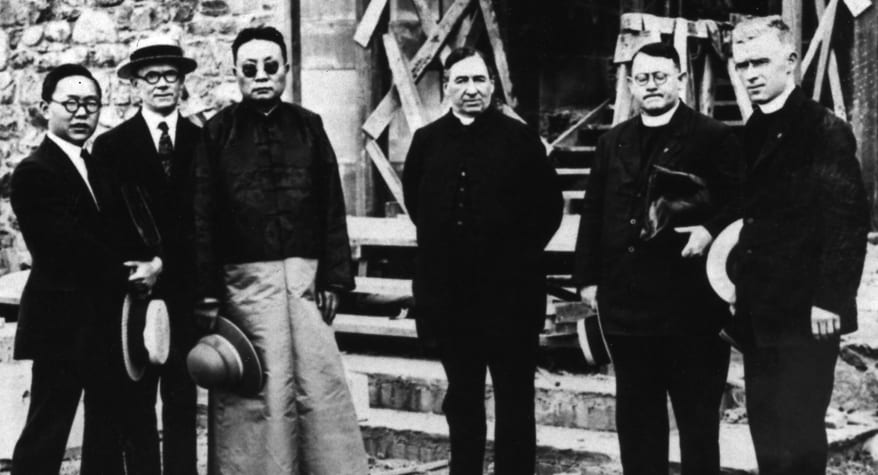
by Maryknoll Society | Nov 16, 2011 | Call to Mission, Events & Celebrations, Notable Maryknollers
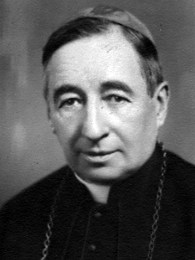 The year commemorating the centennial of the Maryknoll Fathers and Brothers has again been blessed. The Maryknoll Society is rejoicing for the cause for beatification and canonization of Maryknoll Society co-founder Bishop James A. Walsh.
The year commemorating the centennial of the Maryknoll Fathers and Brothers has again been blessed. The Maryknoll Society is rejoicing for the cause for beatification and canonization of Maryknoll Society co-founder Bishop James A. Walsh.
On Wednesday, November 9, 2011 at the Archdiocese of New York in New York City, the cause for beatification and canonization of Bishop Walsh was formally opened by the diocesan tribunal led by Monsignor Douglas Mathers. Receiving official approval from the Vatican to begin, the procedure now is formally in place to pursue the cause for beatification of Bishop Walsh in the Archdiocese of New York.
Attendees at the ceremony included Father Edward M. Dougherty, superior general of the Maryknoll Society who has served the mission of the Church in Africa. All official witnesses took their oaths on the Bible to discharge their respective obligations with integrity and honesty.
The next steps in the process include:
• Obtaining formal witness testimony.
Since few people today actually met Bishop Walsh, who died during 1936, his cause is considered, technically, an “historical” cause. Most evidence will be textual. Witnesses to be called will be faithful Catholics willing to testify as to their belief in Bishop Walsh’s reputation for sanctity and heroic virtue.
A second class of witnesses will be divided into groups of historians and theologians. Historians are charged with gathering and guaranteeing the authenticity of any documentation on the life, works and faith of Bishop Walsh that includes all published and unpublished writings. They will submit reports about his writings along with a biographical sketch. The theologians will examine the papers and then issue reports verifying the integrity of the candidate and absence of any defect of faith and morals.
• Documentation delivered to Rome.
Once the cause is complete at the diocesan level, all documentation will be delivered to Rome for the second phase of the process. Reports and documentation again will be examined. Further documentation, including any possible testimony of miraculous intervention, will be gathered.
• Prayers and inquiries of others.
During the process, anyone interested in the cause of Bishop Walsh is welcome to inquire about him at Maryknoll, offer pertinent faith experience and offer prayers of support of the cause, and, especially, of the mission of the Church to which Bishop Walsh dedicated his life.
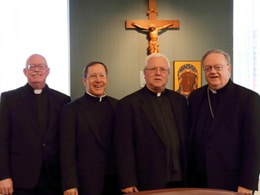
Monsignor Douglas Mathers, second from left, vice chancellor of the archdiocese and episcopal delegate for the cause, joins Auxiliary Bishop Dennis Sullivan, the archdiocese’s vicar general, right; Father Edward M. Dougherty, M.M, superior general of the Maryknoll Fathers and Brothers, second from right; and Father Michael P. Walsh, M.M., member of the historical commission, left, at the swearing-in ceremony for the opening of the sainthood cause of Maryknoll co-founder Bishop James A. Walsh at the Catholic Center in Manhattan on November 9. Photo courtesy of Catholic New York.
Beatification and Canonization Witnesses
• Postulator: Dr. Andrea Ambrosi
• Episcopal Delegate: Reverend Msgr. Douglas J. Mathers
• Promoter of Justice: Reverend Richard Welch C.Ss.R.
• Actual Notary: Maryknoll employee Marie Ray
• Adjunct Notary: Maryknoll employee Maureen Foster
• Copyist: Maryknoll employee Holly E. Brown
• Members of the Historical Commission (3): Reverend Michael P. Walsh, M.M. (who has served the mission of the Church in South China), Alan B. Delozier and Paul F. Gibbons
• Members of the Theological Commission (2): Patrick Hayes and Reverend Mark Francis O’Malley
About Bishop James A. Walsh
James Walsh was born to middle-class parents (James Walsh and Hanna Shea) in Cambridge, Massachusetts, on February 24, 1867. After attending public elementary school, he graduated from Boston College High School with skills in debating and journalism. He attended Boston College but later transferred to Harvard College to study bookkeeping. Studies were completed at St. John’s Seminary in nearby Brighton.
At the seminary, Father Walsh was inspired by a rector, a Sulpician (a society of secular priests founded during 15th century France) whose classmate in Paris, Theophane Venard, had died as a famous martyr in Indochina. A decade after his 1892 ordination at the Cathedral of the Holy Cross, Father Walsh retraced Venard’s steps in France along with those of other French martyrs, and he became convinced that the blood of martyrs is the seed of the church.
Father Walsh served as curate at St. Patrick’s Church in Roxbury until he was appointed diocesan director of the Society for the Propagation of the Faith during 1903. Among his responsibilities was to raise money to support overseas mission, and during this time, he began to develop his vision, a modernized version of mission, for a mature U.S. Church that was eager to fulfill exciting and joyful missionary responsibilities around the world.
Along with the Catholic Foreign Mission Bureau, Father Walsh founded The Field Afar magazine, a monthly publication about the foreign missions of the Catholic Church. Years later, this magazine would become the Maryknoll magazine that continues to be published today (along with its bilingual counterpart Revista Maryknoll) by the Maryknoll Fathers and Brothers.
During 1910, at the 21st Eucharistic Conference in Montreal, Father Walsh shared his vision of U.S. Catholic mission with Father Thomas Frederick Price of North Carolina. Realizing they shared a common call to mission, the urbane Father Walsh and the more rural Father Price collaborated on plans for a mission society within the U.S. Catholic Church. Soon after, the bishops of the United States formally sanctioned the pursuit of their vision to recruit, send and support U.S. missioners around the world.
With this approval, Father Walsh and Father Price traveled to Rome to present their vision of mission. They received the blessing of Pope Pius X on June 29, 1911 (the feast of Saints Peter and Paul), which is the founding day of the Catholic Foreign Mission Society of America that, over the years, has become more well-known as Maryknoll Fathers and Brothers.
Father Walsh was a model priest and a natural leader. He was the first Superior General of the Society, the treasurer, the editor of its publication, rector of the seminary, spiritual director of the Maryknoll Sisters that was formed during 1912, along with master organizer, fundraiser, publicist and overseer of plans and building for the Society. It is difficult to find any aspect of the foundation of Maryknoll that did not benefit from the direction and oversight of Father Walsh.
Father Walsh’s contributions to the Catholic Church in the U.S. and to the growth of mission were celebrated when he was ordained as bishop on June 29, 1933 by Pope Pius XI in Rome. Only a few years later, on April 14, 1936, Bishop Walsh passed away.
Causes for Father Price and Father Capodonno
The cause for beatification and canonization of Bishop Walsh is the third for the Maryknoll Society.
Causes have been established for Maryknoll co-founder Father Thomas F. Price (pending) and for Maryknoll Father Vincent R. Capodanno.
Thomas Price was born in Wilmington, North Carolina, the eighth child of Alfred and Clarissa Bond Price, on August 19, 1860. Having converted to the Catholic faith, his parents raised their children to be devout Catholics in the midst of Southern apathy toward the religion.
During his formative years, Thomas Price was deeply influenced by priests from his Wilmington parish of St. Thomas. With a religious upbringing that included profound understanding of the deep devotion his mother held for the Blessed Virgin Mary, the young Price soon became attracted to the priesthood. Father Price became the first Catholic priest born in North Carolina.
Vincent R. Capodanno was born on February 13, 1929 in Staten Island, New York. During the 1960s, he asked to be reassigned from his Maryknoll mission in Formosa to serve as a U.S. Navy chaplain. He served with a unit of the U.S. Marines in Vietnam and, though mortally wounded during an ambush on September 4, 1967, he continued to administer to others who were injured.
Father Capodanno is the only chaplain to receive the Medal of Honor for service with the Marine Corps. During 2011 in Triangle, Virginia, the Marine Corps Heritage Foundation dedicated the “Sacrifice Window” to Father Capodanno in the Semper Fidelis Memorial Chapel at the National Museum of the Marine Corps.
Watch a video about Bishop Walsh click here.
Watch this same video on Youtube by clicking here.
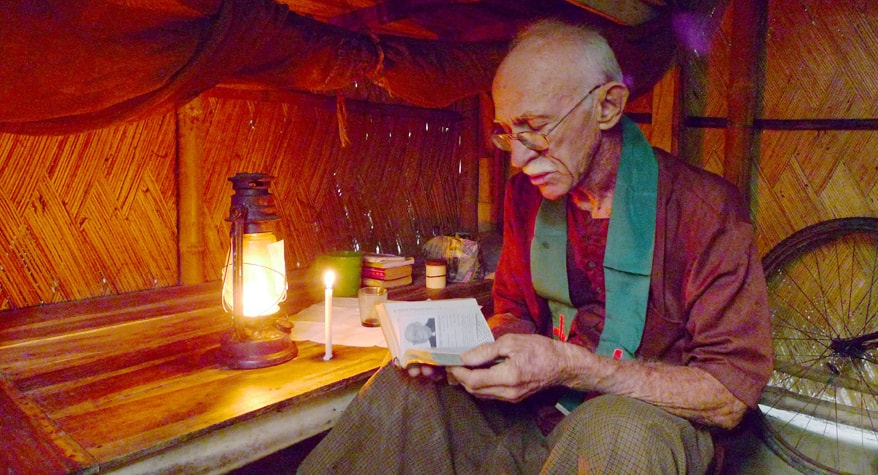
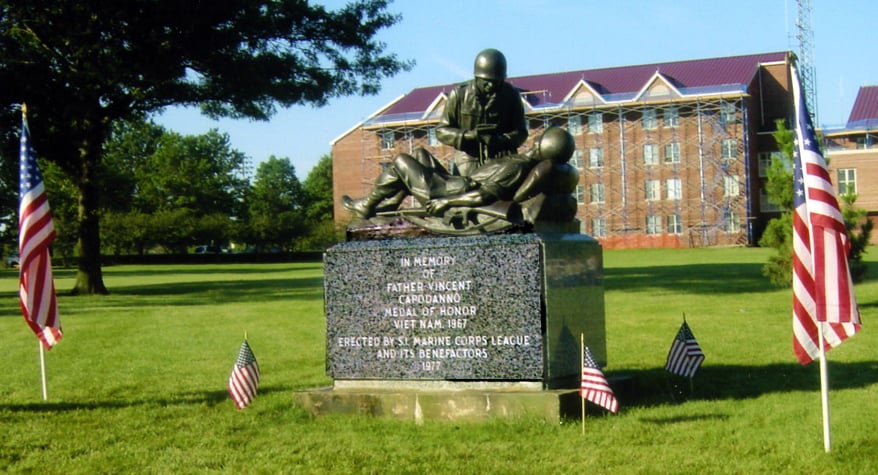
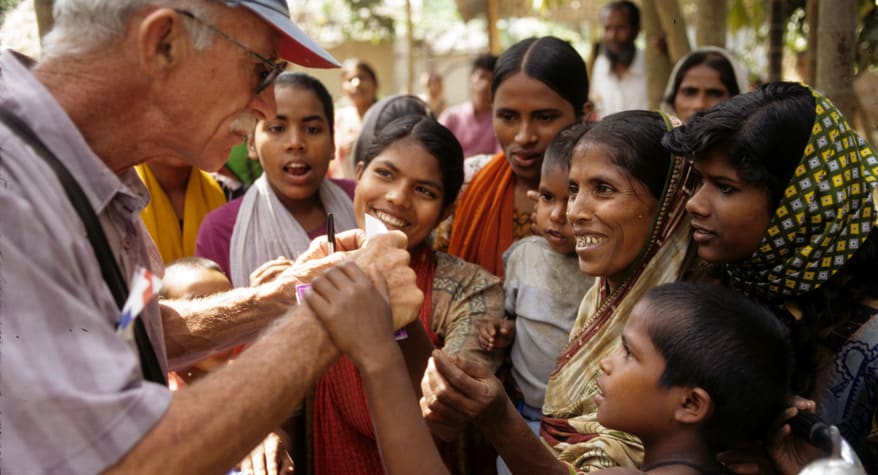

 “We must love before we can truly value an alien culture,” Bishop Francis Xavier Ford, M.M.
“We must love before we can truly value an alien culture,” Bishop Francis Xavier Ford, M.M. A Life Of Mission In China
A Life Of Mission In China During his work in China, Bishop Ford developed a fondness for the people and he adopted their culture. Through his homilies and mediations, Bishop Ford drew on inspirations from the liturgical year and the rhythms, or seasons, of life in China. By April 1951, the Kaying Diocese had 19 Chinese priests and 26 Chinese Sisters to serve 23,000 Catholics.
During his work in China, Bishop Ford developed a fondness for the people and he adopted their culture. Through his homilies and mediations, Bishop Ford drew on inspirations from the liturgical year and the rhythms, or seasons, of life in China. By April 1951, the Kaying Diocese had 19 Chinese priests and 26 Chinese Sisters to serve 23,000 Catholics. Chinese officials soon began closing churches and parish houses. When the Unites States entered into war with North Korea, tensions grew and Bishop Ford was prohibited from participating in activities outside of Kaying. The first Maryknoll priests and Sisters were arrested and deported during December 1950.
Chinese officials soon began closing churches and parish houses. When the Unites States entered into war with North Korea, tensions grew and Bishop Ford was prohibited from participating in activities outside of Kaying. The first Maryknoll priests and Sisters were arrested and deported during December 1950.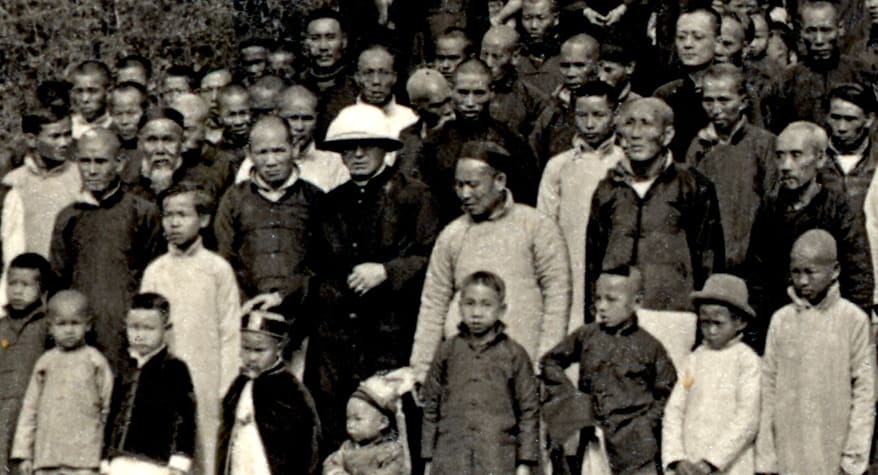

 The year commemorating the centennial of the Maryknoll Fathers and Brothers has again been blessed. The Maryknoll Society is rejoicing for the cause for beatification and canonization of Maryknoll Society co-founder Bishop James A. Walsh.
The year commemorating the centennial of the Maryknoll Fathers and Brothers has again been blessed. The Maryknoll Society is rejoicing for the cause for beatification and canonization of Maryknoll Society co-founder Bishop James A. Walsh.
